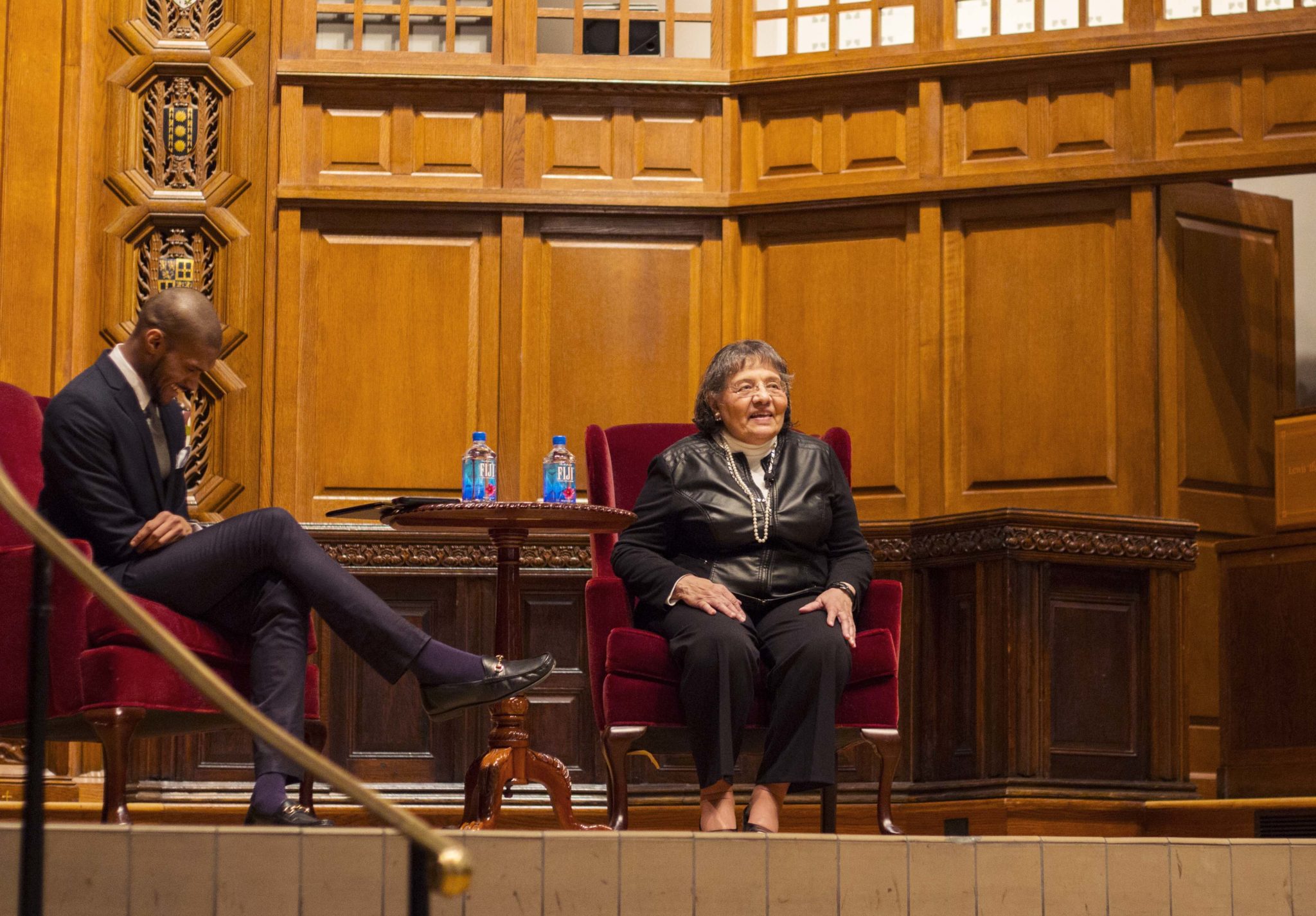
Over 500 Yale affiliates and New Haven residents gathered in Battell Chapel on Wednesday night to hear Diane Nash, who served as one of the key strategists for the 1960 Nashville sit-ins, deliver this year’s Rev. Dr. Martin Luther King, Jr. Lecture.
Nash spoke about her experiences as a student and woman in the civil rights movement and on the importance of nonviolence. The two-hour event concluded with a representative from the Mayor’s Office presenting Nash with a proclamation that celebrates the legacy of King and recognizes her contributions.
Nash opened her talk with the story of how she met King. Her serious speech was peppered with light remarks including a mention of a double date with King and his wife Coretta Scott King.
“Following segregation rules made it seem like I was agreeing I was inferior,” Nash said as she recalled her experiences after moving from the south side of Chicago to Nashville, Tennessee to attend Fisk University.
Eager to combat segregation, she attended workshops in nonviolence, helped lead the effort to integrate lunch counters in Tennessee, and successfully worked to desegregate interstate buses as a member of the Freedom Riders, a group of civil rights activists who fought against segregation on buses in the South.
These efforts were not without struggle, Nash said. She spoke about the first Freedom Ride, which had to be disbanded because the bus was firebombed and the people severely beaten. She also recalled thinking she would have her first child in jail, as well as other struggles women of the Civil Rights Movement faced.
“Besides Rosa Parks, few people can name women in the Civil Rights Movement and what their contributions were,” Nash said. “Ella Baker contributed as much to the Civil Rights movement as Martin Luther King [Jr.].”
She also acknowledged the accomplishments of other often-forgotten women, including voting rights activist Fannie Lou Hamer, active sit-in participant Peggy Alexander and field organizer Mary Hamilton.
Nash also outlined the tenets of nonviolence: the major principles of the strategy and the six phases of enacting it. Her impassioned defense of the approach implored the public to struggle for freedom instead of waiting for elected officials to provide it.
In conclusion, she addressed how common narratives of King’s work often ignore critiques from within the movement, adding that many activists thought he worked too slowly.
“Media and history books often frame the civil rights movement as [King’s] movement,” Nash said. “That’s not true. It was a people’s movement.”
N’Kosi Oates DIV ’17, graduate assistant at the Afro-American Cultural Center and a member of the MLK Planning Committee, opened the event by emphasizing the importance of “creative maladjustment” — standing up to injustice instead of tolerating it — and described students as “the vanguard for social change” and central to the progress of the nation.
Yale College Dean Jonathan Holloway, who introduced Nash, also spoke on the role of students in progressive movements. Holloway challenged the audience to acknowledge the nuance in greatness and posed King’s famous question — “Where do we go from here?”
“We go to our past so we can understand our present and imagine our future,” he said. “Where do we go from here? We start. Right here.”
Elisia Ceballo-Countryman ’18, a student in Calhoun College, asked Nash at the question-and-answer session how to move forward after experiencing failure, citing Yale’s decision last April not to rename Calhoun. Nash responded that being part of a determined group of people who were willing to sacrifice their lives for one another motivated her when she faced setbacks.
Tyler Miles ’20, an attendee who asked about misogyny in the Civil Rights Movement, told the News that hearing that civil rights activists were working “for us, a generation that they didn’t even know but already loved,” was the most powerful part of the lecture.
Shades, a student a cappella group devoted to the music of the African Diaspora and African-American tradition, sang “We Shall Overcome,” a key song of the Civil Rights Movement. The moving rendition was interspersed with a reading of Maya Angelou’s “Still I Rise” by Idonia Thomas, a high school senior at Common Ground High School in New Haven. The performance received a standing ovation.
The keynote address is part of a series of events planned by the MLK Planning Committee to commemorate King’s life. There are currently exhibitions dedicated to him at the Sterling Memorial Library Nave, Beinecke Rare Book and Manuscript Library and the Yale University Art Gallery.
The event was sponsored by Dwight Hall at Yale, the Yale College Dean’s Office, the Afro-American Cultural Center at Yale and the Office of the Secretary and Vice President for Student Life.
Correction, Jan. 26: A previous version of this article omitted Dwight Hall at Yale as the fourth co-sponsor of the event.







